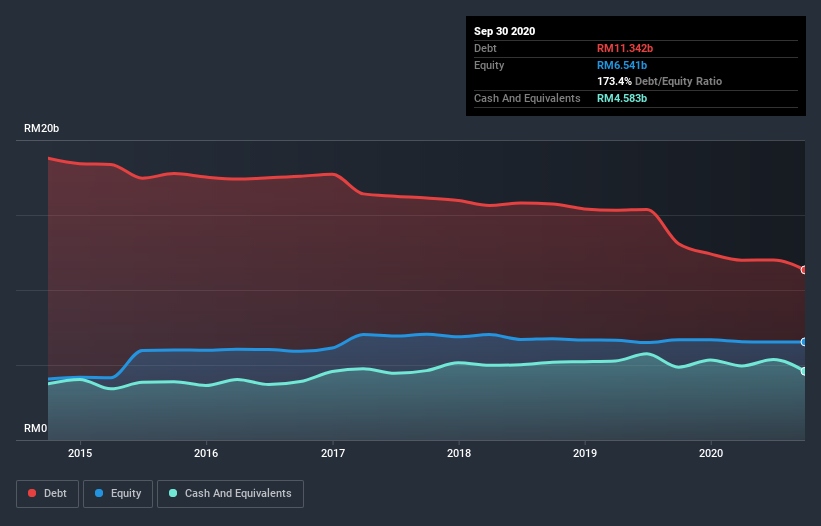- Malaysia
- /
- Renewable Energy
- /
- KLSE:MALAKOF
Malakoff Corporation Berhad (KLSE:MALAKOF) Takes On Some Risk With Its Use Of Debt

Legendary fund manager Li Lu (who Charlie Munger backed) once said, 'The biggest investment risk is not the volatility of prices, but whether you will suffer a permanent loss of capital.' It's only natural to consider a company's balance sheet when you examine how risky it is, since debt is often involved when a business collapses. Importantly, Malakoff Corporation Berhad (KLSE:MALAKOF) does carry debt. But is this debt a concern to shareholders?
Why Does Debt Bring Risk?
Debt and other liabilities become risky for a business when it cannot easily fulfill those obligations, either with free cash flow or by raising capital at an attractive price. In the worst case scenario, a company can go bankrupt if it cannot pay its creditors. However, a more usual (but still expensive) situation is where a company must dilute shareholders at a cheap share price simply to get debt under control. By replacing dilution, though, debt can be an extremely good tool for businesses that need capital to invest in growth at high rates of return. The first thing to do when considering how much debt a business uses is to look at its cash and debt together.
View our latest analysis for Malakoff Corporation Berhad
What Is Malakoff Corporation Berhad's Debt?
The image below, which you can click on for greater detail, shows that Malakoff Corporation Berhad had debt of RM11.3b at the end of September 2020, a reduction from RM13.1b over a year. However, it does have RM4.58b in cash offsetting this, leading to net debt of about RM6.76b.

A Look At Malakoff Corporation Berhad's Liabilities
According to the last reported balance sheet, Malakoff Corporation Berhad had liabilities of RM2.84b due within 12 months, and liabilities of RM15.4b due beyond 12 months. Offsetting this, it had RM4.58b in cash and RM1.29b in receivables that were due within 12 months. So its liabilities outweigh the sum of its cash and (near-term) receivables by RM12.4b.
This deficit casts a shadow over the RM4.40b company, like a colossus towering over mere mortals. So we'd watch its balance sheet closely, without a doubt. After all, Malakoff Corporation Berhad would likely require a major re-capitalisation if it had to pay its creditors today.
We use two main ratios to inform us about debt levels relative to earnings. The first is net debt divided by earnings before interest, tax, depreciation, and amortization (EBITDA), while the second is how many times its earnings before interest and tax (EBIT) covers its interest expense (or its interest cover, for short). The advantage of this approach is that we take into account both the absolute quantum of debt (with net debt to EBITDA) and the actual interest expenses associated with that debt (with its interest cover ratio).
While Malakoff Corporation Berhad's debt to EBITDA ratio (2.6) suggests that it uses some debt, its interest cover is very weak, at 2.5, suggesting high leverage. It seems clear that the cost of borrowing money is negatively impacting returns for shareholders, of late. It is well worth noting that Malakoff Corporation Berhad's EBIT shot up like bamboo after rain, gaining 40% in the last twelve months. That'll make it easier to manage its debt. There's no doubt that we learn most about debt from the balance sheet. But it is future earnings, more than anything, that will determine Malakoff Corporation Berhad's ability to maintain a healthy balance sheet going forward. So if you want to see what the professionals think, you might find this free report on analyst profit forecasts to be interesting.
Finally, a business needs free cash flow to pay off debt; accounting profits just don't cut it. So we clearly need to look at whether that EBIT is leading to corresponding free cash flow. Over the last three years, Malakoff Corporation Berhad actually produced more free cash flow than EBIT. That sort of strong cash generation warms our hearts like a puppy in a bumblebee suit.
Our View
We feel some trepidation about Malakoff Corporation Berhad's difficulty level of total liabilities, but we've got positives to focus on, too. For example, its conversion of EBIT to free cash flow and EBIT growth rate give us some confidence in its ability to manage its debt. Looking at all the angles mentioned above, it does seem to us that Malakoff Corporation Berhad is a somewhat risky investment as a result of its debt. Not all risk is bad, as it can boost share price returns if it pays off, but this debt risk is worth keeping in mind. When analysing debt levels, the balance sheet is the obvious place to start. But ultimately, every company can contain risks that exist outside of the balance sheet. Case in point: We've spotted 3 warning signs for Malakoff Corporation Berhad you should be aware of, and 2 of them are a bit unpleasant.
If, after all that, you're more interested in a fast growing company with a rock-solid balance sheet, then check out our list of net cash growth stocks without delay.
If you decide to trade Malakoff Corporation Berhad, use the lowest-cost* platform that is rated #1 Overall by Barron’s, Interactive Brokers. Trade stocks, options, futures, forex, bonds and funds on 135 markets, all from a single integrated account. Promoted
New: Manage All Your Stock Portfolios in One Place
We've created the ultimate portfolio companion for stock investors, and it's free.
• Connect an unlimited number of Portfolios and see your total in one currency
• Be alerted to new Warning Signs or Risks via email or mobile
• Track the Fair Value of your stocks
This article by Simply Wall St is general in nature. It does not constitute a recommendation to buy or sell any stock, and does not take account of your objectives, or your financial situation. We aim to bring you long-term focused analysis driven by fundamental data. Note that our analysis may not factor in the latest price-sensitive company announcements or qualitative material. Simply Wall St has no position in any stocks mentioned.
*Interactive Brokers Rated Lowest Cost Broker by StockBrokers.com Annual Online Review 2020
Have feedback on this article? Concerned about the content? Get in touch with us directly. Alternatively, email editorial-team (at) simplywallst.com.
About KLSE:MALAKOF
Malakoff Corporation Berhad
An investment holding company, operates as an independent power production and supply, and environmental management company in Malaysia.
Slightly overvalued with limited growth.
Market Insights
Community Narratives



